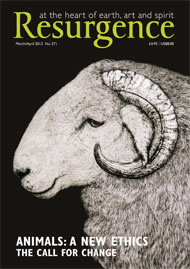In his book Speciesism, Painism and Happiness, Richard Ryder brings together his previous arguments on animal ethics and combines them into thought-provoking possibilities for debate about adopting a unified approach to morality and legislation on the rights of animals.
He argues that moral principles and ideals such as justice, freedom and equality, for example, are “mere stepping stones to the ultimate good, which is happiness; and happiness is made easier by freedom from all forms of pain and suffering”. “Painism” is the term he uses to encompass this new-world moral theory, in the hope of creating a “fresh and unified moral outlook” amongst humankind; in other words, extending our care and concern for any species that is “painient”, meaning able to experience pain and suffering.
That animals do experience pain – that when they are in pain they scream and writhe like we do, and that they can suffer – gives them moral status, and therefore we should include them in our moral circle.
The author goes on to cite recent research that shows that many animal species show empathy, and therefore further demonstrates that animals have their own morality. For example, elephants mourn their dead. This empathy also extends towards humans, an example being that of dolphins protecting humans from shark attacks.
Ryder also looks at consciousness, stating that it is scientifically accepted that “it is a function of the awake brain” and that “it is correlated with activity in the brain’s cortex.” He concludes that “as all mammals, and many other animals, have brains with similar cortices and chemical neurotransmitters, it is reasonable to assume that these species are also conscious.” And so, he adds, to not include animals in our moral circle and actively to exclude and exploit them is to discriminate against them; he calls this “speciesism”, the animal equivalent of human racism or sexism.
Ryder – who has been a proponent of the ethical treatment of animals since the 1970s – claims that the theory of full inclusion of animals within a moral society is slowly becoming a reality, although it is still highly debated. It would seem he could be right, as can be seen, for example, with the current transposition to UK law of the EU directive on the protection of animals used in scientific procedures, which has recently come into force across the European Union. An explanatory statement of the aim of the directive made clear that “the ultimate goal should be to replace the use of animal experiments altogether.”
The theory and implications of painism, however, are considerable and go far beyond the mere treatment of animals: they delve into the very foundations of human society and our perspective of morality; but Ryder’s arguments are compelling, particularly in his comparisons of utilitarianism and Rights Theory.
He asks us to look deeply into the question of the oppression of a whole species and suggests that we should concentrate on the individual rather than the race, nation, group or species that suffers – an important principle of painism. Logically, he explains, if we care about the suffering of humans then we should care about the suffering of non-humans. It is about cultivating compassion, extending the same moral and legal rights to animals and abolishing the exploitation of them by stepping down from our self-righteous pedestal of believing ourselves to be superior to other species.
Would we, for example, experiment on a human without his or her consent? Would we sit idly by and watch them suffer pain or distress without doing anything to remove their suffering, even though it might (and I emphasise the word ‘might’) offer some mild benefit or convenience to millions of others?
Would we be comfortable watching a human, poisoned with a toxic household product, linger in agony for hours or days before dying? Would we use mentally disabled adults, for example, who are unable to communicate, or factory farm human babies to be used for drug testing? Of course not, so why do we accept that it is morally acceptable to do the same with animals?
Ryder’s book is uncomfortable at times, but deeply provoking and filled with arguments born from his simple truth that we must go further in creating a universal and unified moral outlook – one that “recognises the rights, interests or welfare of the animals themselves”.






